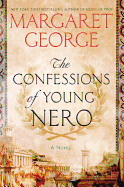
Margaret George's specialty is biographical novels, taking legendary historical figures and unearthing the human being buried beneath centuries of myth and propaganda. In books such as Mary Queen of Scotland and the Isles and Helen of Troy, George sympathetically reconstructed the inner lives of men and women often ill-served by history. The Confessions of Young Nero represents one of George's most ambitious rehabilitations to date as the first of two novels dedicated to the brief but eventful life of the titular Roman Emperor Nero.
Nero was the last of a dynasty, and succeeding emperors and the historians they patronized would have been incentivized to delegitimize his rule by casting him as a tyrant and a libertine. The Confessions of Young Nero, told from Nero's perspective, is a corrective, offering up an alternative portrait of a sensitive, creative young man forced to navigate Rome's brutal power games.
The novel opens with Caligula throwing a very young Lucius Domitius Ahenobarbus, later Nero, in the water to drown, an early introduction to the dangers of absolute power. Growing up in exile, Lucius might never have become Nero were it not for the murder of Caligula and his family, along with the ruthless machinations of his mother, Agrippina. Agrippina climbs the rungs of power quickly through marriage and political gamesmanship. Seen through young Nero's eyes, Agrippina's brutal ways inspire mixed emotions from her son, as well as harsh lessons: "Let them call me cruel. Better that than dead."
As Agrippina engineers her son's rise, he finds his true calling in music, scholarship, chariot racing and the Hellenistic sports of wrestling and running. Agrippina describes him as a "dreamy boy" who "doesn't notice much of what goes on in the real world." This depiction of an oblivious, if not overtly callous Nero is one that has persisted through the ages. George sets it right, however, showing Nero's growing aptitude for courtly intrigue, and the widening gulf between him and his mother. After being adopted by the Emperor Claudius thanks to Agrippina's influence, Nero earns his new name, as well as the attention of famous historical figures such as the philosopher Seneca, who serves as his tutor.
However much Nero might wish to live a simple life as a poet or a musician, his hopes are frustrated by Agrippina's ambitions. In one fell swoop, she poisons Claudius and has Nero installed as emperor. His priorities are forced to shift drastically as he's simultaneously imbued with enormous power and increasingly threatened by Agrippina's attempts to usurp his authority. Still, Nero is gifted with a peaceful, wealthy empire that practically runs itself. He freely indulges in evenings of "theater, dance, and composing poetry and music" as well as raucous parties. In place of his loveless marriage, Nero soon falls for a freed slave named Acte. As the dangers at court increase, Nero's passions and indulgences follow suit.
George never faults Nero for his interests in the arts or pursuit of pleasure. In her forgiving, humanistic vision, rigid ideologues such as Seneca are painted as hypocrites rather than heroes. In one memorable passage, Nero dismisses Seneca's seminal "On Mercy" as a "long-winded essay" intended only to soothe the philosopher's conscience.
Instead of victories in battle, George gives Nero credit for his diplomatic triumphs and ambitious architectural projects. Thanks to his lavish games and support for the arts, Nero earned the love of the common people while irritating the aristocratic Senate. Nero's personal values didn't align with traditional upper-class Roman values of martial courage and discipline. Readers get the sense of Nero as a man out of time, someone who might have prospered in ancient Athens, for example. Even notorious events that helped earn Nero's unenviable place in history, such as Nero's murder of his own mother, are rendered as acts of self-protection that nonetheless torture his conscience. George suggests that the "tyrant" perceived by later generations was not born, but made, his sense of morality shaped by his upbringing and the demands of survival.
The Confessions of Young Nero asks what responsibilities a leader has to his people, especially if the demands of leadership interfere with personal happiness. Is it selfish to engage in supposedly frivolous pursuits that give your life meaning? Nero's philosophy is simple: "...I want the maximum of happy moments...." In retrospect, Nero's major folly seems to be in thinking of himself as a person, rather than the living embodiment of the state.
George's novel may not prove to be the definitive historical interpretation of Nero, but her thoughtful, humane treatment of the man will inspire readers to question his status in the popular imagination as a depraved pleasure-seeker. --Hank Stephenson

